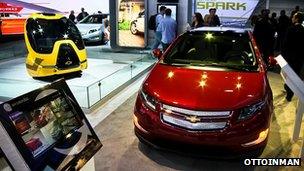Electric cars' future continues to remain unpredictable
- Published
"Gas prices are the big driver, pushing for pioneering technology in electric cars even if the combustion engine still dominates," BBC's Caroline Hepker
When the Chevrolet Volt was named the 2011 North American Car of the Year in Detroit, you could have been forgiven for thinking that the electric car's time had finally come.
After years of development and false starts, a plug-in electric vehicle (albeit one that still has a petrol engine on board), aimed right at the middle of the mass market, was being celebrated as a great car that also happened to be powered by electricity.
A year later and there seems to be a lot less to cheer about the Volt and the future of the electric car.
The Volt itself has sold poorly, barely over 8,000 in its first year.
A problem with batteries catching fire won't have helped, but Chevrolet's main competitors for the electric vehicle market, also reported dismal sales.
The Nissan Leaf for example managed just under 10,000 sales in America last year.
In a total market of 12.8 million vehicles such numbers are tiny to the point of insignificance.
Yet none of the manufacturers are prepared to call electric vehicles insignificant.
The future

Despite a high profile launch Chevrolet's Volt has not been able to clock high sales numbers
At this year's show, as is now standard, new electric models are being rolled out, usually after very expensive development, and celebrated as "the future".
It's a future that receives the whole hearted endorsement of the US government.
Energy secretary Steven Chu has been in Detroit this year, touring the big names in electric vehicles, and talking up their prospects.
"Do I think electric vehicles 10 years from today will be major part of the market?" he says. "Yes, because the battery costs and the electric motor costs will be dropping."
Nevertheless, the executives in charge of these vehicles admit they face a big challenge getting electric vehicles accepted in the mass market.
Jim Federico at General Motors says of the Volt, and electric cars in general: "It is brand new technology so it's a huge education for the public."
It's also a huge burden on consumers' wallets.
The price of an electric car is usually at least $10,000 (£6,400) more than its petrol-engined equivalent.
Old technology
But the main threat to the electric vehicle may in fact be an old technology that's showing remarkable resilience.
Petrol-fuelled internal combustion engines may be the arch polluters of our age, but they keep getting more and more efficient.
Not only that, the auto industry keeps finding that consumers aren't anywhere near ready to give them up.
Lacey Plache, the chief economist at Edmonds.com says this year's Detroit Motor show reveals a noticeable shift in the industry over the last year.
In 2011 all the focus was on the new Volt and other electric vehicles and concepts.
"This year," says Plache, "there's been a shift to improving traditional internal combustions and I think this really speaks to what consumers want".

Chevrolet's Mr Federico says generating mass appeal for electric cars is a big challenge
Given the respective sales numbers for petrol versus electric cars, it's hard to argue with that assessment.
But it poses a considerable dilemma, not to say a huge business challenge, for the car makers.
On the one hand, if the future is electric then there is presumably a great advantage to being early to release cars that are designed to be electric from the wheels up.
On the other, pouring money and resource into developing those models runs the risk of diverting investment away from the technology and the models that are actually going to sell, and repay your investment, soon.
In some ways General Motors, with the Volt, has made a significant bet on that first mover advantage, hoping investment that doesn't pay off in immediate sales will reap other benefits instead.
As Jim Federico says of the Volt; "It's also an image of the company, that you offer new technology, that you want to lead the way, and that brings customers to your company."
Contrast
By way of contrast, Ford has not developed a purpose-built electric vehicle.
It does offer hybrid and now electric versions of models that are already successful petrol-engined cars, but in some ways its biggest bet so far has been on improving internal combustion technology.
It has had notable success with its "Eco Boost" engines which are up to 20% more fuel efficient than standard internal combustion, thanks to the use of turbo charging and direct petrol injection.
Ford says this isn't just good business, it also thinks that by making petrol engines cleaner it is making a real, as opposed to perceived, contribution to reducing global CO2 emissions.
"In the near term the biggest impact we can have is in improving the fuel economy of the biggest volume of our vehicles. That's why we have Eco Boost," says John Viera, Ford's global director of sustainability.
It is not that Ford doesn't see a future dominated by electric vehicles, it is just that that future is proving very difficult to time.
"We know eventually electric vehicles are going to be the biggest volume," says Viera.
"But we know that isn't a switch we can turn overnight."
Guessing game
Hardly surprising then that the forecasts for how much of the global car market will be electric, and by when, are incredibly imprecise and vary wildly.
Some among the carmakers think electric vehicles could make up as much as 25% of the car market by 2020.
Some analysts however think that could be less than 5%.
In other words, the industry is just guessing about the timing of the most basic transformation it has ever faced.
Given that 20% of 2020's market will represents millions of vehicles and millions of dollars of investment - the fate of whole companies probably rests on who guesses right.